
Today, I was finally granted my exit visa from Neutropenia. I’ve been stuck there since Thursday, and had been hanging around impatiently at the border from around Monday onwards, as the border guards were being quietly unhelpful.
It’s a familiar situation for anyone who has ever worked abroad in difficult places, or indeed in foreign news. I remember the most uncomfortable day or so that I spent at one border post between Iraq and Jordan, in the time when Saddam Hussein was still very much in charge of Iraq.
I had been in Baghdad as the correspondent doing bureau cover for the BBC for a month or so over Christmas and New Year 1998, at a time of high tension between Saddam Hussein’s government and the west.

His government was apoplectic with the American and British military alliance that was flying Operation Desert Fox, a major four-day bombing campaign on Iraqi targets from the 16th of December to the 19th aimed at ensuring that the UN no-fly zones over Iraq held, and that the Iraqi leader could not use his remaining air force to bomb any of his own people, or indeed anyone else.
My boss Malcolm had rung me up in his usual laconic style a week or so before. I was the BBC’s Bonn correspondent, but there was not much of a story in that small town in Germany that month.
“How would you feel about going to Baghdad for Christmas?” he asked.
My heart sang. I could see swimming before me, as in reality I looked out over the dull misty rain in my garden overlooking Bad Godesberg, the gold souk and the spice market in Baghdad. The place would be full of the exotic smells of nutmeg, cinnamon, and the sweet tobacco smoke of the shisha pipes outside the cafes, mingled with the exotic undertone of the lack of decent drains across much of the Middle East. It might also be full of bombs and bullets, but I didn’t think too hard about that. I was 31 and keen on adventure.
On my bookshelf at home was a battered, powder-blue copy of Baghdad Sketches: Journeys through Iraq by Freya Stark, published in 1932. I’d wanted to go there ever since. Stark was one of those indominatable women who are probably more fun to read than to marry or be friends with.
She was a British-Italian-Polish-German explorer and travel writer, whose two dozen or so books (if you can still find them – mine came from a musty second-hand bookshop on Charing Cross Road of the sort that are rapidly being driven out by clothing and café chains) charted her travels through the Middle East and Afghanistan.
Born in 1893, Stark had received a copy of One Thousand and One Nights, and thanks to childhood illness, spent much time in her mind travelling the Orient, and decided later that she would do it for real, deciding first very wisely (something I had signally failed to do, unlike my gifted BBC colleagues Caroline Hawley, Frank Gardner and James Longman) to first learn Arabic (and in her case, as well as Persian).
By 1931, she had already travelled to places in southern Arabia that few western men had ever ventured. Later, during the Second World War, she joined the British Ministry of Information, and helped create a propaganda network called the Brotherhood of Freedom, aimed at persuading Arabs to remain neutral or even to support the Allies. Freya Stark died in 1993, just five years before her book made me want more than anything to see the Tigris and the Euphrates for myself.
Lost in reverie, I said nothing, and my boss Malcolm must have interpreted my silence for doubt.
“It would only be for a month. Have some time to think about it. Don’t rush. It’s a big decision, as it could be quite dangerous given the politics at the moment. Call me back in 10 minutes or so and let me know.
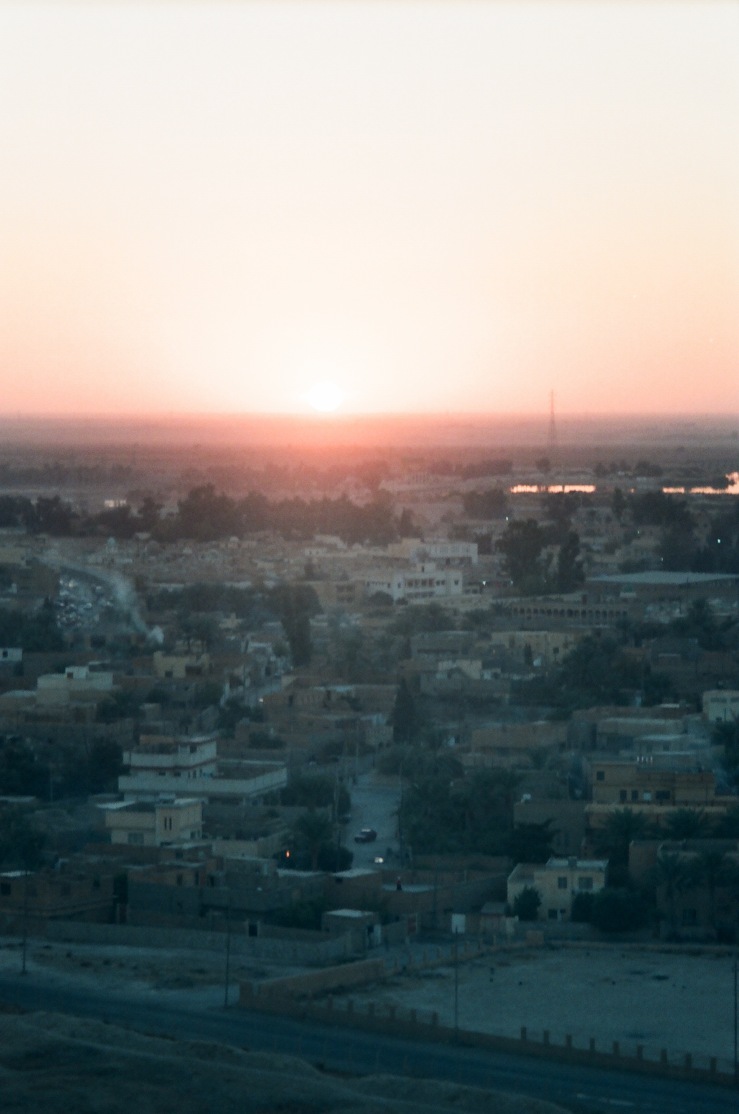
And Malcolm put the phone down. My mind was already made up. Nothing was going to stop me going to a city that had been one of the jewels of the Arab world. Even its name sung an exotic melody, a compound name of Bagh (god) and dad (given by). Translated, it was a town called God’s Gift, and at Christmas 1998 it sounded exactly like God’s gift to a young journalist keen to show what she could do.
And, as it turned out, the real correspondents, the ones who knew what the were doing, Jeremy Bowen and John Simpson were keen to get home for Christmas. So God’s Gift it was for me that Christmas, and Malcolm was gruffly delighted when I called him back a mere three minutes later to say so. My parents less so. Who would eat my portion of turkey? Given the appetites of the rest of my family, I wasn’t quite so concerned. Journalistic selfishness won v daughterly duty.
I packed my suitcase, travelled to London, and discovered that Malcolm also wanted me to take an enormous Christmas hamper from Fortnum and Mason for the BBC staff in Baghdad. They were mostly at least nominally Muslim, but generally quite keen on food and other treats in the UN sanction-blighted days under Saddam.
My darling wicked stepmother, aka WSM, was aghast when she saw the amount of luggage that I planned to take. A huge backpack, the F & M hamper, which was the size of a healthy seven year old and just as heavy, and another suitcase.
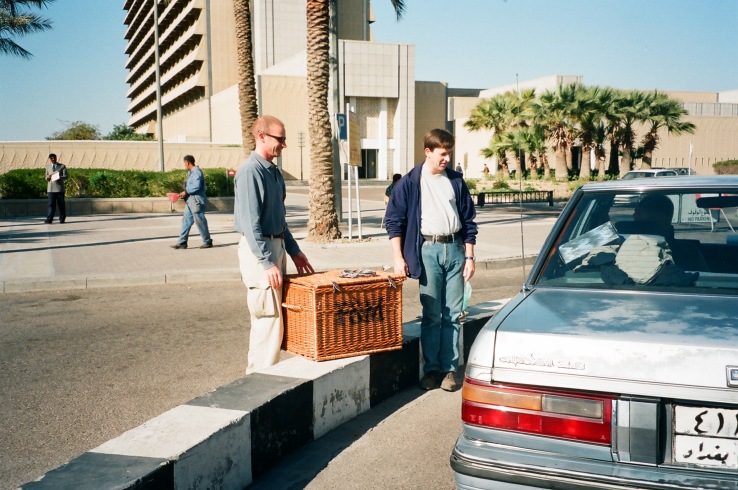
It was worthy of William Boot, the hero of Scoop, or indeed of Freya Stark herself, who horrified one of her guests after her wedding reception at St Ermine’s hotel in Victoria as she helped her to pack for the later-in-ife honeymoon and spotted Stark’s selection of peekaboo underwear.
So I unpacked on the floor of my parents’ living room, just to prove that everything I was carrying was vital. Microphone, radio kit (rather larger in those days), plenty of spare batteries, sensible clothes, desert boots, sunhat, sunscreen. Towels, teabags, small iron for shirt so that it wasn’t crumpled on air. Adapters for the plugs just in case. We were nearly at the bottom of the bag now.
And then quite unbidden, out popped my black stiletto shoes, my velvet black party dress, and a rather splendid black basque and some lacy bras and knickers.
My WSM’s eyes nearly popped out. There was a long silence.
“Why are you taking a black basque to Baghdad?” she asked, in a tone of incredulity.
Er. Because. Because I was 31 and unmarried. Because Baghdad was an exotic place that deserved exotic undergarments. And because it was Christmas and New Year at the location of the biggest news story of the year, which meant that there would undoubtedly be a lot of hard partying in between much hard work.
The basque and party dress came with me, and some of the duller shirts stayed behind in London.
I was delighted to find on arrival at God’s Gift that I had been right all along. I entered the Al Rasheed hotel in Baghdad, trying not to tread too heavily on the face of US President George H W Bush that was depicted on the tile mosaic in the entrance hall (the soles of the shoes, and in particular walking with the dirty sole of one’s shoes over someone’s face is a serious insult in the Arab world, as you can imagine). And saw that already in the lobby that everyone who was anyone in the world of journalism was gathering there, in a blizzard of boxes and self-importance.
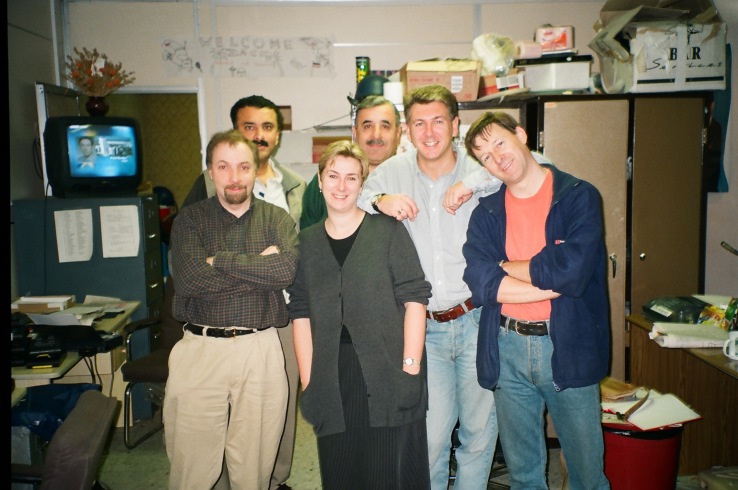
Most delightful and unexpected of all was the team from the Sun, journalist and photographer both dressed as Santa.
“Why are you dressed as Santa?” I asked them as I began the lengthy process of checking in.
“Because we have come to Iraq to give the children of Iraq their Christmas presents, which they would otherwise not get under Saddam Hussein,” answered the photographer laconically. Or as laconic as you can be wearing a Santa hat in a hotel lobby in Baghdad.
“But isn’t this a Muslim country? One that therefore doesn’t celebrate Christmas?” I asked, suddenly uncertain of the one fact that had lodged solidly in my brain about Iraq in all the reading I had done for the past intensive week of preparation.
Nobody likes a clever dick trying to ruin their story.
The Sun photographer and his journalist shrugged. They certainly were not going to let a mere detail like that spoil their Christmas splash. And they didn’t.
I think they were on pages 1 – 5 in full Santa mode that Christmas, delighting the orphan children of Baghdad shown to the Sun team with great delight by Saddam Hussein’s press minders, who could sense a propaganda coup.

The rest of my month in God’s Gift was an eventful one, in many ways, but that is definitely a story for another day, as the sun has long since set over the volcano here, and I am tired.
On the appointed day in January at the end of my stint in Baghdad, when the grown-up correspondents were due to return from their families and their Christmas holidays, our bureau driver, a personable young Kurdish Iraqi called Dylan, took me as far as the border, driving the 800 kilometres for hours through the desert with barely a stop en route, except a brief one to the service station loos, where the smell proclaimed that something had recently died and was still there, gently rotting in the heat.
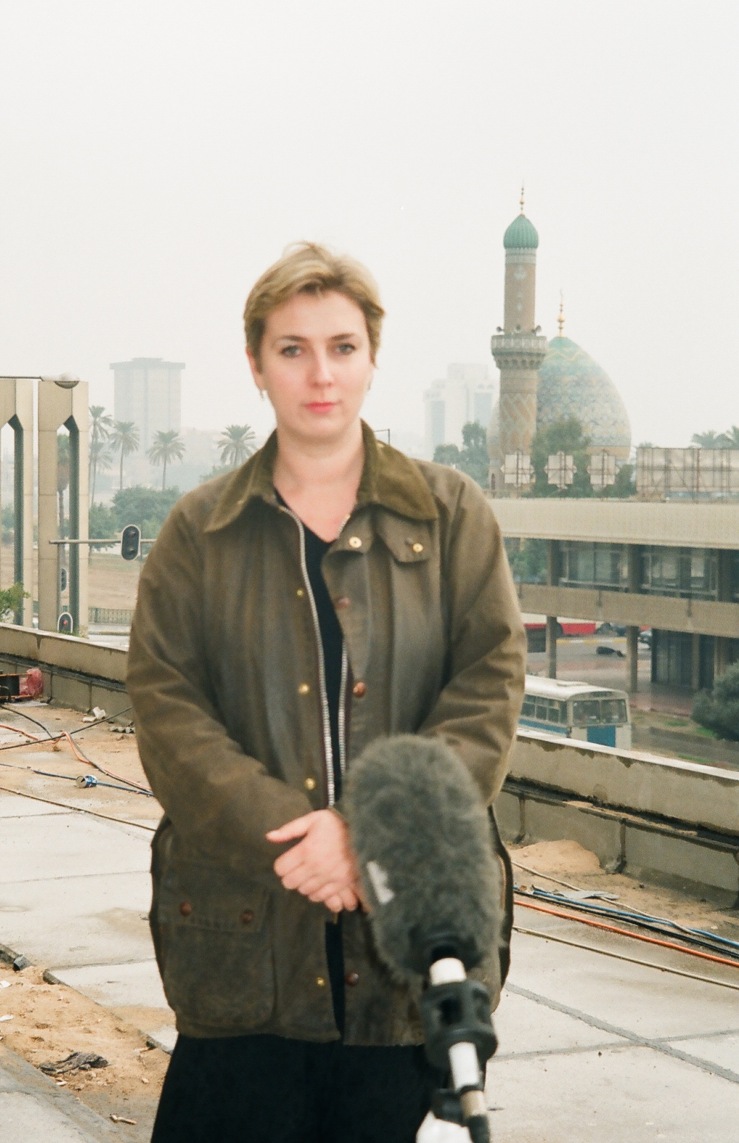
I’d watched as we drove west up Highway 1, and Fallujah became Ramadi and we took the fork in the road near Ar Rutba and headed due west. The dawn melted into midday, and the towns and cities receded, the desert changed colour and the towns petered out into the occasional crumbling mud-brick dwelling, and then into no human habitation at all.
I’ve always loved deserts. Their infinite variety of colours. The life that lives just beneath the parched surface. The occasional human intervention that you know will sink beneath the curling dunes within decades, dust to dust, ashes to ashes.
From the multi-coloured sands in the Painted Desert in Arizona to the harshest deserts of all in Afghanistan, to the tufty sand, stone and scrub of Al Anbar province in Iraq, these are places that leave time for thought and contemplation, impossible in towns or even in my very own green countryside of home.
The skies over deserts are bigger and they are better. Clearer, and cleaner with air that holds no noise and little scent. With nothing at all to get in the way of the feast for the eyes that the generous desert offers you at night, as unthinkingly as a small child gives you their laughter, or unquestioning love.
In the desert, the stars and the Milky Way, and the very universe above are laid out magnificently just for you and your private contemplation at night (and that of the other privileged few amongst us seven billion or so tiny pin-pricks on the planet below).
After a minute or so, the stars really do start to twinkle, the Milky Way shimmers as if in a dream, and the occasional shooting star streaks through the sky like a Hollywood actor destined for insane levels of fame followed by an early death.
And you realise as you look at the heavens above with a secret thrill just how inconsequential your own problems are in the face of a universe that has existed for more than 13 billion years before you, and that will endure, inshallah, for many more.

These stars, this heaven, survived without your help, or your to do lists, or your frantic planning and organisation, or your constant thinking about the next story already when you’ve barely finished the one you’re on, and they will survive for many millennia after you, and without you.
Night had not yet fallen, although it was threatening to when Dylan and I arrived at the rickety border post some eleven hours after we set off. I knew that my permission to leave the country and all my papers were in not merely in good order but in that most excellent state of bureaucratic perfection that can only exist in an absolute dictatorship. The BBC’s staff at the office in Baghdad had seen to that with lengthy cups of tea and perhaps a little more at various Iraqi ministries.
The Ministry of Information, an institution that had clearly modelled itself on George Orwell’s Ministry of Truth in the flourishing Baghdad of the 1950s, had made sure of that. My copious cups of tea with the press secretary, discussing the woes of the world, and the appalling state of his gout, and the wonderful carefree time that he had once spent in London, had also ensured that I knew for certain that my papers were in the best possible order.
But the middle-aged Iraqi Colonel with the Saddam-alike moustache who appeared to be in charge of this particular border post (which on that day was the only one that really mattered to me) was a man who visibly enjoyed the power he so corpulently wielded.
He toyed with us awhile, as we sat and had a cup of hot black tea, with what tasted like three spoonfuls of sugar, and no milk. I looked around the room outside his office. Dispiritingly, there were four or five other journalists there, at least three of them from Japan. They looked as dusty and weary as we did, but with rather more worry etched on their faces.
“How long have they been here?” I asked the Colonel, whose English was impeccable, nodding at the all male group outside. He took a long and thoughtful sip from his steaming glass cup before he answered, and his face took on a positively cherubic air, with an expression that managed to mingle delight, smugness and regret without disarranging a single facial feature.
“Two days.” A pause. Their papers are not in order,” and he shook his head in sorrow, that smile still in place.
My heart sank. I urgently needed a shower, a working loo and a good sleep. And to get out of Iraq and then home as quickly as possible. In that brief month, I had fallen utterly in love with what I’d seen of this place and its people, but a month of being followed constantly by our Ministry minders had begun to prey on my nerves. As did the knowledge that if the political situation changed suddenly, so might my chances of going home, impeccable papers or not.
I looked at the Colonel, and asked him if he smoked.
“Yes, I do. But cigarettes are terribly expensive here,” he sighed. And clapped his hands for another cup of tea.
“Might I, as a gift from my esteemed country to your esteemed country, and as a mark of the pleasure that I have enjoyed as a guest here for the past month of President Saddam Hussein’s government and the Iraqi people, dare to offer you some of the excellent Marlboro Red that I have with me? I am about to give up smoking, so these 400 cigarettes are no longer of any use to me,” and I gave him my best convent boarding schoolgirl smile.
“This is the last packet I shall smoke, so please, do not be offended if I ask you to consider the rest yours.”
The Colonel looked rather pleased, and his jowls rose as his smile widened to lose the element of sadness, and instead express a gentle delight at the kindness of foreign travellers.
“That would be very kind, and I can’t say I have any objection.”
I gently slipped the Marlboro red from my backpack, and sipped at my tea, which was now cool enough to drink with greater pleasure. Then I decided to risk offering him a cigarette there and then, so we could talk outside where we couldn’t be heard.
The Japanese journalists sighed heavily in the main room as we passed by. They were too polite to push the point, and sat in bewildered resignation, as they had done for two sunsets already.
Over the first cigarette, as we watched the desert sun go down, I pushed too soon, thinking that 400 Marlboro Red had been sufficient lure for the Colonel.
“My papers are in order, so I assume that we can go now, before sunset?”
The Colonel shook his head with what seemed almost like real sorrow.
“No, they need some more scrutiny, and we’ll have to call Baghdad to make sure. But it’s past five, so there won’t be anyone there to ask until the morning.”
Desperation began to rise in my heart, and despair too. But I turned the conversation to other matters.
“Are you married, Colonel, and do you have children?”
The Colonel beamed.
“I have five children, and my wife is a marvellous mother. I am very lucky. Though of course, life is difficult here,” a small verbal nod to the myriad difficulties of life in Saddam Hussein’s Iraq, where death and torture were just as likely to be the results of years of public service as a gold watch, a medal and a portrait of Saddam Hussein in his best hunting outfit, or a Saddam clock, with the very centre of it Saddam speaking on a bright pink telephone.
I waited for the Colonel to carry on.
“My wife spends all our money on the children, and she has very little to wear. She is forever longing for new dresses. But it is not possible on the wage of a Colonel.”
And he looked out into the middle distance, a sigh mingling with the smoke of his cigarette.
“Forgive my ignorance Colonel, but how much does a dress cost in Iraq these days?”
“Oh, it can be up to a hundred US dollars for a good one,” he said, still looking hard into the middle distance, as though it might betray a clue to the vagaries of family finances.
“And how many dresses does your wife long for?” I asked.
“She really needs at least three, as hers are getting quite old. But of course, that is well beyond my means,” and he lit up another cigarette.
As he continued to stare into the middle distance, and the sun finally darkened to a glow on the horizon ahead – in Jordan, where freedom lay – I silently opened my money-belt and made a quick fingertip check. Yes. $300 US dollars was my exact emergency fund. This would be a risk but it was one worth taking.
“Colonel…” I looked at him intently. “You seem like a good family man. Would you be immensely insulted if I left a very small token of my profound respect for all Iraqi women here, as represented by your wife. Just a little something for those dresses, as a gift from a grateful guest of your country? It is all I have, but I would be honoured if she would accept it, from an English sister.”
“Why,” he said, eyes widening in apparent surprise. “That would be very welcome indeed. My wife would be most grateful. She’s always liked the English, even if I’ve always told her that you can’t trust them in this part of the world.”
He curled his hand so quickly around the dollars that I didn’t even see where they went.
But as we went back inside, he nodded to Dylan, who was waiting nervously indoors, and to a junior border guard, who brought over our confiscated passports.
Back in the Colonel’s office, our exit was now be a mere formality as the passports were stamped, and we headed back to the car. We passed the Japanese journalists, whose heads lifted as their jaws dropped in indignation.
“What the hell did you do to get out so fast?” asked one.
“Ask the Colonel about his wife and her wardrobe,” I said, with the smile of the Sphinx, and Dylan and I drove off happily towards the darkening skies and to freedom in Ammam.
I shall never forget the Iraqi Colonel and my liberation at the border that day.

Today’s liberator at the border was far kinder, though he’s cost rather more. Dr Guillermo Ruiz, the head of Clinica Ruiz, and eminent haematologist and HSCT expert was the man who liberated me from the land of Neutropenia today. Tall, with an air of eminence mixed with genuine kindness, he shook my hand before he sat down and opened my notes.
And at 12.25 on this 24th day of January 2017, he looked down at my white blood cell count and declared himself delighted. My bone marrow was working perfectly, and my neutrophils were up. I was at 10,000, well within normal range, and out of neutropenia. My blue face-mask could come off at last, and I walked out of his office as delighted as any student on graduation day, after their lack of study and last minute revision has somehow won them a miraculous 2/1.

My new stem cells, those lazy medical students, the ones who were supposed to be studying for their final leucocyte exams before they finally gathered more soberly in my bone marrow and my veins to come and escort me out of Neutropenia today had just been dozy. They probably had been lingering down the pub or having a lie-in, just as I fondly remember Teresa and Ann, my fourth year housemates at University, doing for much of their medical studies.
I don’t know why it was, certainly for our generation, those teetering on the brink of 50 or already slipped over its jagged peak, that medics were among the hardest drinkers. Why not engineers or we poetic, slightly more effete students of English? I took a combined honours degree with German, and the language students definitely partied harder. Perhaps they needed to exercise different parts of the brain, just as learning a new language does.
I know that learning a foreign language can increase the size of your brain. MRI scans by scientists in recent years have shown that taking up a foreign language has a visible effect on the brain, leading to growth in the hippocampus and areas of the cerebral cortex related to language, while also rewiring the connections in the brain.
People who speak more than one language fluently have better memories, and it’s thought their brains may well compensate better for any damage, perhaps because they’re used to making different connections across the brain. Some studies even suggest that Alzheimer’s disease and the onset of dementia are diagnosed later for people who speak two languages rather than one, so that studying and speaking a second language may well help our brains to stay healthier throughout life – at whatever stage that second language is learned.
I still silently thank my parents to this day for bringing us up bilingual in English and Swiss-German, and later German, an unearned inheritance that may for many years have fought off at least some of the damage inflicted by MS as it attacked my nerves and brain, as I sought to perfect my German, better my French, and learn at least some Russian. And this month, gather enough words in Spanish to get by.
Sometimes, the sheer number of words floating around in my head have left me groping for the right one in the language of the country I am currently in, and brain fog has made it much harder to learn. And sometimes, I think, those fragments of language and belonging (or not belonging) to several cultures and countries have left me a strange hybrid creature, hovering in the borderlands of every country in which I live and work.
But today, all I know is that my stem cells have got a move on, and are busy in my system at the start of their new lives.
After the consultation with Dr Ruiz, the stem cell sisters of Group 1 were taken back to the chemo room, this time to have Rituximab piped in to our veins. It is a drug that should also help kill off any remaining rogue B cells, the ones that have also been attacking me over the years by mistake.

Lupita, a nurse with gentle brown eyes and a equally gentle way with needles, pierced my left hand, my Clinica Ruiz stigmata ahead of my planned resurrection to good health, and began the last infusion. The room was peaceful, happy. It was our last treatment here. Some three hours of sitting down in a somnolent peace with my new stem cell family: Anne, Charlotte, Marion and Laila and their caregivers. Joy sat next to me, as patient as ever, and brought a can of hot fruit tea.
For I have been tired today, far more tired than for the last three weeks. I hadn’t realised how much the early chemo had cleared my brain, nor how the steroids that went with it had given me more energy than I’d had in years. They may have caused some other problems (my bottom is much better today, thank you). And I realise today that I hadn’t even felt the ghastly fog of MS settling on my brain like the mist around Popacatapetl in the mornings for two whole weeks.
But today it was back. Along with aching knees, electricity buzzing up my face, and a back that hurt like hell. It was as if that mist of brain fog and fatigue had settled in this morning soon after I woke up, like the Scottish drizzle on every new year that I’ve spent in Edinburgh, and it showed equally little sign of stopping soon.

Inside me now, I know, a civil war is raging. I am out of Neutropenia, thanks to the doctors and my stem cells springing into life. My USD gift at the border here was enough to get me here and out of Neutropenia. But while this battle is won, the war for me is not yet over as I try to find the exit visa from the Kingdom of the Sick.
I’d thought of my stem cells this afternoon, as I lay in the chemo room, as individual Roman gladiators playing to the crowds as they speared each rogue cell in triumph. But tonight I realise that it is not the right picture.
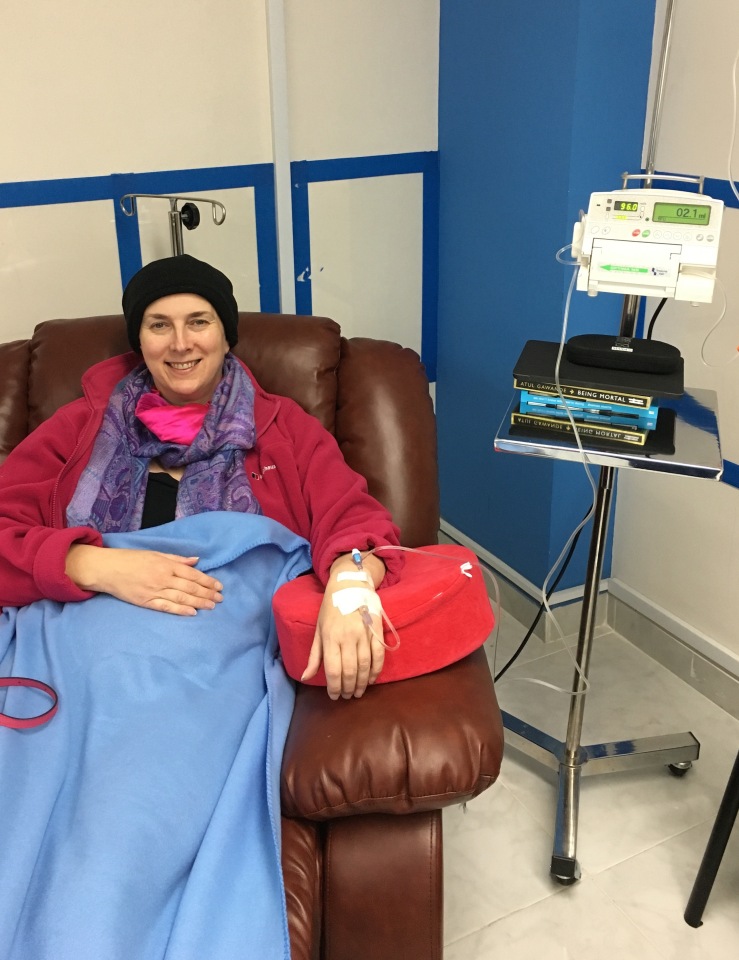
This is a far bigger civil war, with insurgent fighters lurking in every cell, and an enemy so cunning that it has hidden in my every cell and organ for more than twenty years, re-emerging for a skirmish just as I thought it might have given up the fight.
It will take far longer to defeat it than my 28 days here in Mexico, and patience and cunning will be required in equal measure. Perhaps for a matter of years. HSCT does not necessarily work immediately but over the course of the next two years. Even the full effects of the Rituximab may not be felt for another 16 to 24 weeks at a cellular level – another four to six months.
This is much more like the conflict in Afghanistan, its roots every bit as deep, and its warring tribes keen on the fight. Indeed, the MS seems as eager to do battle as a proud young Pashtun warrior being told what to do by the young beardless British lieutenant who has just arrived at his village bearing the solution, agreed by the sages in Whitehall, for an end to the conflicts that have riven and bloodied its parched soil for centuries.
My weapons in this war within will be gentle ones. Subversive, even. And unusual for me. Rest, sleep, good home-cooked food and sunshine for as long as possible. No stress, no massive deadlines, and being kinder to myself and to my new immune system. It is only a baby, and I must spoil it like one. Shower it with love, and kindness. Enjoyment, good books and catching up with friends. And spending time with family, once I’m out of quarantine.
Today, the Freya who made me smile was not Freya Stark and her Arabian adventures, but my own very first great-niece Freya. She is slightly, though not much, older than my stem cells. Her photo, sent by her proud grandmother Penny, shows a slightly tired and pissed-off baby, who doesn’t like the camera at all. Freya is not amused today.
She had to pose for her first passport picture at the age of a little over a month. Perhaps she too, will become an explorer of deserts, or push the boundaries for women in the future in other ways. Her name derives from the Norse goddess of love and fertility, so maybe she will become a midwife who does her work with the same passion and dedication as her aunt Trini, who delivered her.
Or she may simply work hard and do well like her mum, my niece Carly, whose achievements at work owe as much to her sunny disposition and charm as to her stubborn determination and tenacity.
As long as Freya is happy, and healthy. As I go to sleep tonight, I shall contemplate the wonder of my nieces marrying, having babies and growing up.
And I shall dare to dream tonight, thanks to Joy’s lavender under the pillow, of living a long and healthy enough life to see young Freya’s children, too. And to become a great-great aunt. Or certainly, a better aunt than I have been in the past.
First, though, I must win the war inside me. A friend told me today to think of Sun Tzu, the Chinese military strategist who wrote the Art of War, as I fight my own internal battles.
He sent me some quotes:
The Art of war is… a matter of life and death, a road either to safety or to ruin. It is governed by five constant factors: the moral law, heaven, earth, the Commander, method and discipline.
The Moral Law causes the people to be in complete accord with their ruler, so that they will follow him regardless of their lives, undismayed by any danger.
Heaven signifies night and day, cold and heat, times and seasons.
Earth comprises distances, great and small; danger and security; open ground and narrow passes; the chances of life and death.
The Commander stands for the virtues of wisdom, sincerely, benevolence, courage and strictness.
By method and discipline are to be understood the marshaling of the army in its proper subdivisions, the graduations of rank among the officers, the maintenance of roads by which supplies may reach the army, and the control of military expenditure.
These five heads should be familiar to every general: he who knows them will be victorious; he who knows them not will fail.
According as circumstances are favourable, one should modify one’s plans.
So that’s clear then. My campaign to leave the Kingdom of the Sick needs a clear plan of attack, and a strategy stretching out beyond the HSCT here at Clinica Ruiz. I shall start to prepare it in the morning with the help of my best and brightest stem cell lieutenants.
I just hope they don’t turn out to be as bright as Baldrick in Blackadder, and that these cunning plans succeed.
But as I sit at my maps and work out my strategy (and as for any modern Army, a good power-point presentation will probably be my first port of call), I may blog rather less in the coming days.
Though we shall see.
Tomorrow is another day.

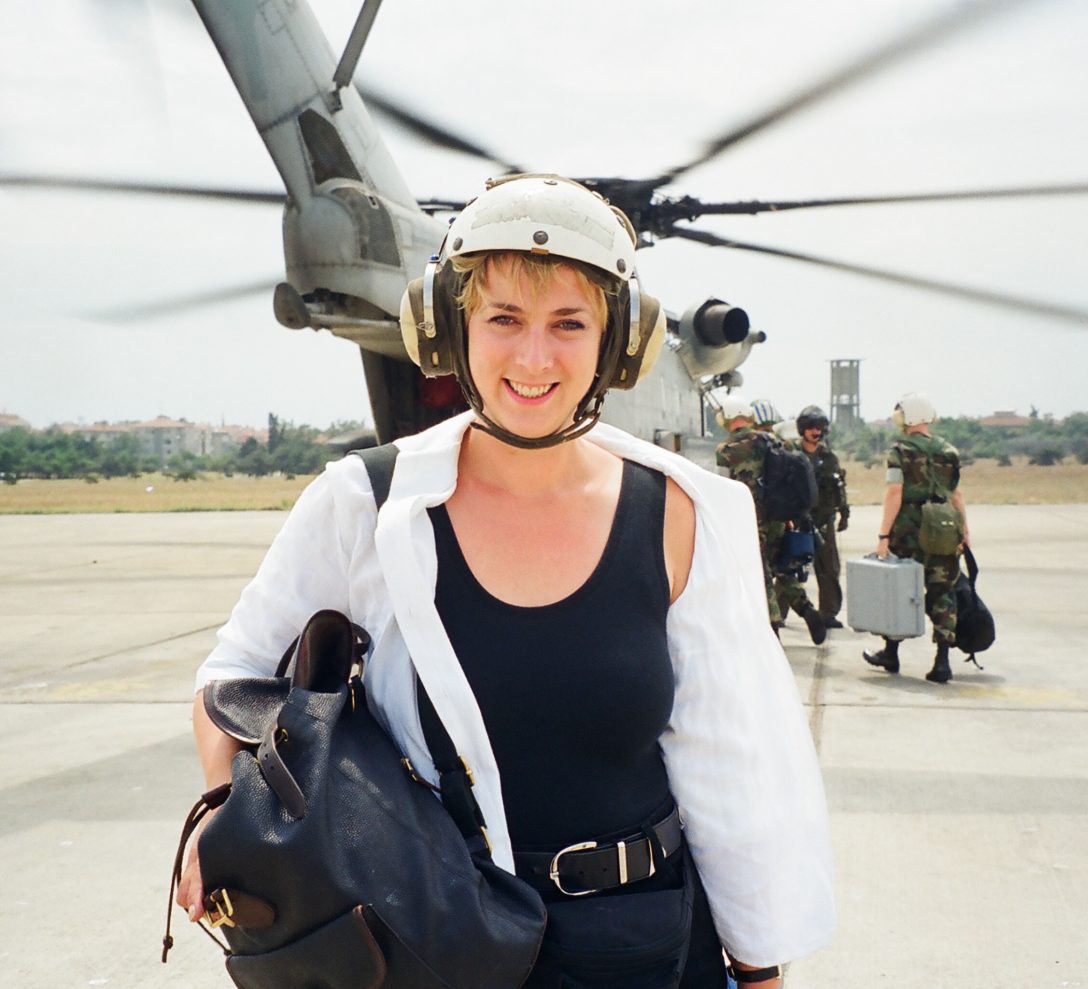
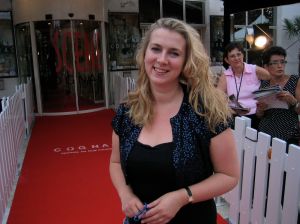
So happy for you that your laid back stem cells have got their affairs in to order in time for your final infusion. Rest up and look after yourself so your body can start healing.
Loved the blog although I really did think you were going to give the border guard your little black dress and heels for his wife ! Not sure how that would have gone down tho – possibly a very different outcome !! X
LikeLike
Stem cells and a tin of cheese soup…and unstoppable combination.
LikeLike
Gertrude Bell. Freya Stark. Two of my favourite writers. And now Miss Whatton too. Good news is always welcome, keep up the good work.
LikeLike
Wyatt, Miss Wyatt. Bloody Samsung predictive text. Sorry, it’s late in the day.
LikeLike
Good 2 here you have got rid of some of ur devels from ur blood. God bless & happy Australia Day.
LikeLike
Awesome.
LikeLike